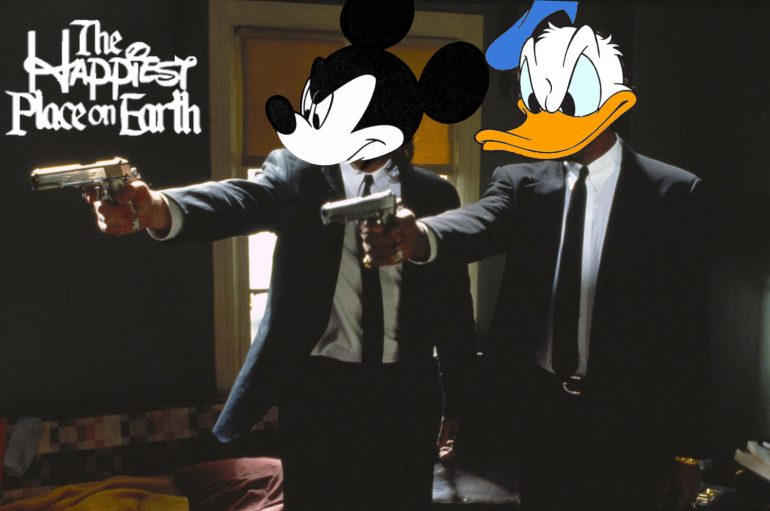By the time John D. Rockefeller’s company Standard Oil was sued by the U.S. government in 1911 for being an “unreasonable monopoly,” the company owned 90 percent of North America’s oil and gas industries, and was acquiring similar sized holdings in China and the Middle East. Standard Oil’s ability to obtain such massive percentages of these industries inspired illustrator Udo Keppler to famously depict Standard Oil in a 1904 political cartoon as a menacing octopus spreading its arms across the U.S. and to the far corners of the globe. While 20th century antitrust laws supposedly make such monopolies impossible in the 21st century United States, it appears that Keppler’s octopus might be returning in the guise of a cartoon mouse wearing red trousers.
The Walt Disney Company is acquiring ownership of 21st Century Fox. While Disney is not (at this time) purchasing the entirety of the massive Fox entertainment empire, it has offered 52.4 billion dollars to acquire Fox’s movie and television production houses. This deal will add to Disney’s already burgeoning list of entertainment assets, but more importantly, the deal positions Disney to become the most powerful entertainment entity in the world, due to a commodity that doesn’t fit well into current antitrust laws: entertainment content.
The Walt Disney Company has not only produced a substantial amount of original content, but also made a point of acquiring the rights to popular material it hadn’t originally produced. For example, Disney has owned the rights to “Winnie the Pooh” since the 1960s. However, over the last twelve years, Disney has taken this practice to new extremes, assimilating into itself nearly any producer of popular content that comes along. When Disney bought Pixar in 2006, they acquired the most successful producer of animated films in the country, when Disney bought Marvel Studios in 2009, they bought the rights to the ever-expanding Marvel film universe; and when Disney bought Lucasfilm in 2012, they bought the rights to the widely popular “Star Wars” franchise. The fact that Disney was able to purchase so much of the entertainment industry indicates some smart business practices on their part, but the problem is what Disney seems to be planning to do with all these assets.
Disney plans to become its own streaming service provider. And the deal with Fox puts Disney in a nearly perfect position to do this. Disney CEO Robert A. Iger publicly announced through CNBC News that his company is planning a standalone streaming service (launch date unspecified). CNBC News also reported that the Disney wants to pull all its movies from Netflix by 2019 in preparation for this launch. But what does Disney mean by “its movies”? Obviously, the animated classics won’t be available, but the movies in the “Star Wars” franchise and the Marvel film universe are all technically “Disney movies.” While Disney hasn’t explicitly defined the line between a “Disney movie” and a “movie owned by Disney,” it has implied that Marvel movies will be among those pulled from other content providers. So when Disney says it will pull its movies, it might literally mean all the movies it owns. Furthermore, when the deal to buy the majority of 21st Century Fox goes through, Disney will own the rights to countless other films. And all this is to say nothing of the television shows with high viewership on Netflix and Hulu that will become property of Disney. Shows such as “The Simpsons,” “Bob’s Burgers,” “It’s Always Sunny in Philadelphia,” “American Horror Story,” and “Family Guy” are all included in the deal. When Fox is eaten by Disney, all these shows (and many, many others) may be permanently pulled from Netflix and Hulu, a move that could financially cripple these companies.
Losing Disney-owned content means streaming services could also lose the financial ability to produce their own content, causing further financial loss. Streaming services rely on third-party-produced content to drive up subscriptions, which provide the profits that make up the budgets for original content, such as Netflix’s “Stranger Things.” Ironically, this idea of amassing what’s most popular in a specific industry, leaving smaller companies with so little to offer that they are forced out of business, is the same method Standard Oil used to gain control of oil and gas industries in the 19th and 20th century. But Disney’s abilities won’t be limited to this tried and true method of capitalism. Disney’s new growth could also mean bad news for both smaller movie producers and film critics, because the deal with Fox will make Disney the largest of the then-only four high-budget film producers in the U.S. Controlling such a large percentage of movies that get produced means Disney will make a huge percentage of yearly film revenues, in turn giving Disney significant control over what films are produced, and what films are not—effectively pushing out the smaller guys. This amount of power also allows Disney to more easily control critical responses to its content. In late 2017, Disney banned film critics working for The Los Angeles Times from advanced screenings of its films. The New York Times reported the ban and, working in solidarity for The L.A. Times, refused to write pre-release reviews of Disney’s films until the ban was lifted. If Disney already feels comfortable attempting to exert this level of control over critics, imagine the level of control it could exercise once it’s the most powerful entertainment producer in the world.
And this is where the real problem lies. Disney’s acquisition of 21st Century Fox extends beyond free market competition and infringes on monopolistic practices. If there is any lesson to be learned from the history of American business, it’s that companies would be monopolies if they could be. And while the intention to grow is rarely a nefarious one, massive companies almost inevitably fall into bad practices—something we can already see happening with Disney as they silence critics from the The Los Angeles Times. Furthermore, Disney’s plans for its introduction into the world of streaming services is riddled with red flags, which indicate Disney may simply starve other streaming services into non-existence as it continues gobbling up more and more popular content for its own use. Time will tell what Disney will actually do with its ever increasing power, but the lovable producer of our favorite childhood movies is quickly moving toward becoming the newest industrial octopus.
This article originally appeared in our May / April 2018 print issue.





